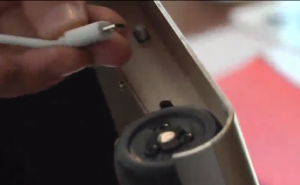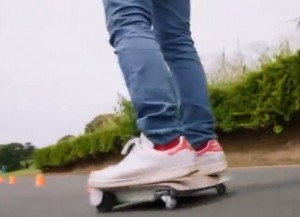Aug. 7 (Reuters) Pocket-sized personal transporters could soon be seen on the streets of Tokyo.
A Japanese engineer has developed a portable transporter small enough to be carried in a backpack that he says is the world’s first ‘car in a bag’.
Twenty-six-year-old Kuniako Saito and his team at Cocoa Motors recently unveiled the lithium battery-powered “WalkCar” transporter, which is the size of a laptop and resembles a skateboard more than a car.

The slender WalkCar is made from aluminium and weighs between two and three kilograms (4.4 to 6.6 pounds), depending on whether it is an indoor or outdoor version.
Saito expects to see many other uses for his transporter, as he says it has enough power to help people push wheelchairs with ease. The lightweight aluminium board is stronger than it looks, and can take loads of up to 120kg (265 pounds).
It reaches top speeds of 10 kilometres per hour (6.2 miles per hour), for distances of up to 12 kilometres (7.4 miles) after three hours of charging.
Its developer says it’s also extremely simple to ride. Once the rider stands on it the WalkCar starts automatically, while simply stepping off stops the vehicle. To change direction, the user just shifts their weight.

Best of all, there is no need to find a parking space, because it fits into a small bag when not in use.
Saito said his studies in electric car motor control systems sparked the idea for the new kind of ride.
“I thought, “what if we could just carry our transportation in our bags, wouldn’t that mean we’d always have our transportation with us to ride on?” and my friend asked me to make one, since I was doing my masters in engineering specifically on electric car motor control systems,” he told Reuters.

Saito says he is confident that WalkCar goes beyond bulkier devices such as the Segway or Toyota’s Winglet.
“Maybe I just see it that way, but it seems to me that the U.S. is always the one which invents new products and Japan is the one which takes those products and improves on them to make a better version of it. But here in this case, the WalkCar is a totally new product I have started from scratch. So I also I want to show the world that Japan can also be innovative,” he said.
Saito says customers will be able to reserve their own WalkCars from autumn 2015 on the crowd-funding website Kickstarter. The futuristic skateboard will have a price-tag of around 100,000 Japanese Yen (approx. $800 USD). Shipping is expected to begin by spring 2016.












